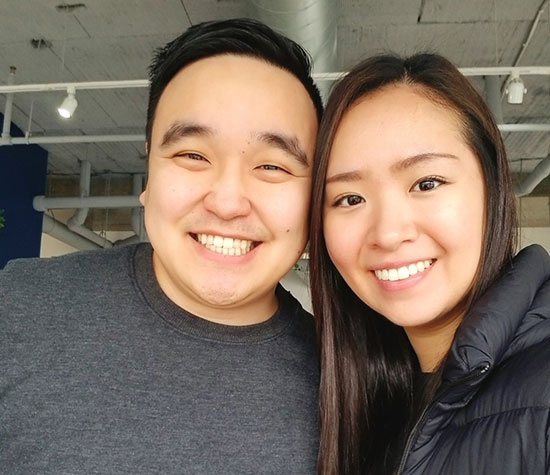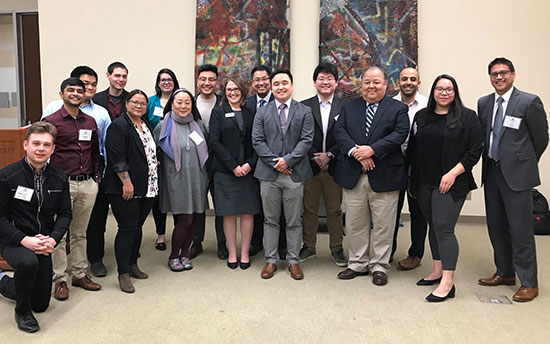
Bryant Park and his wife Sharon Park are looking forward to nights out again, post-COVID.
April 7, 2021 – Wisconsin lawyers practice in every aspect of law – and their backgrounds and skills encompass the great variety of life in Wisconsin.
This year, we introduce you to the leaders of Wisconsin law-related organizations that serve diverse communities.
Meet Bryant Park, president of the Wisconsin Asian American Bar Association (WAABA).
More about Bryant Park
- Position with WAABA: President
- Law School: Marquette 2014
- Firm/company: U.W. Law School – Office of Career and Professional Development
- Favorite Vacation Destination: Charleston, South Carolina
Where did you grow up?
I grew up in Franklin, Wisconsin, but my family’s path to Wisconsin was the result of following my dad in his education. My parents emigrated from South Korea to the East Coast so that my father could pursue his Ph.D. in mechanical engineering. Before my sixth birthday, I toured much of the continental U.S. in a U-Haul truck. From the East Coast, we moved across the country to Los Angeles, where my father ultimately received his Ph.D. Immediately upon graduation, he received a position at Marquette University, where to this day he teaches both freshman and upper-level engineering courses.
While it was never my family’s intention to stay in the U.S., since my siblings and I were born here, my parents found it harder to leave. They ultimately became U.S. citizens themselves two years ago.
What led you to law?
Like many first-generation lawyers, law school was not on my radar until nearly the end of my undergraduate studies. During my undergraduate time at the University of Minnesota Twin Cities, I was heavily involved in their Community Engagement Scholars Program (CESP), which integrated community engagement into a student’s education.
As part of this program, I volunteered my time as an English teacher for residents of an apartment complex located near Minnesota’s campus called the Riverside Plaza. To students, it was known by a far less flattering name. In the 1970s, the complex’s exterior was featured on the Mary Tyler Moore Show. During my time in Minnesota, it was cheap housing for the Twin Cities’ refugee population.
Throughout my months teaching, I learned that many of the students were parents who saw education as the key to bettering their children’s lives and integrating into the local community. They yearned to master English to help their kids succeed in school, but also to understand their children’s experiences growing up in a country they did not know.
CESP required a final project, and I wanted to focus on something that would benefit the class. They asked for a dictionary of common English curse words. While an odd yet humorous project – probably not for their kids – it was not until I asked my class to elaborate that I understood their request. To the students, knowing English curse words empowered them, because it ingrained them into American culture, but also allowed them to identify when they were treated with dignity and respect.
This set the spark in me that whatever I did next, I wanted to be able to help and empower people to succeed. While it may have been some naivety at the time, I viewed lawyers as mythical creatures who could bring about change, or at the very least a legal education would provide me with the skills and knowledge to better understand the world around me.

Members of WAABA gather with Marquette University Law School students at a networking event in 2019.
What are some challenges you face as a lawyer?
The biggest challenge for me was making the ultimate decision to transition from a traditional attorney career track to administrative J.D.-preferred positions. Through some soul searching during the early years of my legal career, I knew I wanted to work with law students.
While my focus was found, I did not think my identity would be tethered to my traditional lawyer job. Many lawyers deal with imposter syndrome, but legal professionals in non-traditional lawyer positions often face an additional layer of identity crisis. I did not think I would be one of these people.
I told myself that my profession does not define who I am. But like Gollum to Smeagol, a voice reverberated in my head. “You are not using your J.D. for what it was intended.” “You are not a real lawyer.” This voice still pops up occasionally, but then I remind myself of billable hours and demanding clients, and the feeling subsides.
How did you become involved in WAABA?
My first encounter with WAABA was during my 1L year at Marquette, through a networking event WAABA hosted at a sushi restaurant. Like my colleagues who attended with me, we heard free sushi, so we came running.
After the initial awkwardness present at many networking events, I was blown away by the open and honest conversations I had with WAABA members. Aside from the obvious joy of meeting successful Asian American attorneys in Wisconsin, I was drawn by how open and supportive the WAABA members were to us law students. Whether they knew it or not, the WAABA members represented hope. That there was light at the end of the law school tunnel. That if they can succeed, so can we. That everything will be OK.
WAABA’s support of law students continues today. One of the core missions of WAABA is to provide support to Asian American law students from both Wisconsin law schools through networking events, mentorship programs, scholarships, and support of their initiatives.
About the Wisconsin Asian American Bar Association
- Number of members: 50
- Primary mission: To improve the fair administration of justice for all, and ensuring the meaningful participation of Asian Americans in the legal profession in Wisconsin
- Annual dues: free for law students and new members, and $25 for continuing members
- How to learn more: To join WAABA, complete this online form. For more information, visit WAABA on Facebook.
Why is leadership in WAABA important to you?
My decision to become president of WAABA was simple. I was nominated, no one opposed, and I accepted. But it is a position I hold with great importance. In the wake of everything happening in this nation, I am constantly reminded of the importance of WAABA and the other sister minority bar associations, in providing a voice to our respective communities.
I recall my first time back at Marquette Law School since graduating. I was attending a networking event when an Asian American law student approached me and asked, “Where are all the Asian attorneys?” I jokingly responded, “We’re here. We just hide very well.”
A common stereotype of Asian Americans is that we do not make waves. This has often made the Asian American community an easy target for jokes or much worse. With the recent horrendous killings in Atlanta of six Asian women, and the rise of 3,800 anti-Asian attacks since the start of the pandemic, recently it has been the latter.
That is why groups like WAABA serve an important role in building community, providing platforms, serving as bridges to other organizations, presenting relevant programming, and giving a voice to and a seat at the table for communities that may not otherwise be present. During my time as WAABA president, it is my hope to continue to ensure that Asian American attorneys are represented in Wisconsin and have a platform for their voice on meaningful issues.
On a personal note, what are you looking forward to in the coming year?
To travel and have date nights with my wife free of COVID precautions and restrictions. Also, I have been entirely working from home since I joined the U.W. Law School community. It would be nice to work with my colleagues in person, interact with law students, experience the U.W. campus, and set foot in my office.
In Case You Missed It: Read about These Organizations and Their Leaders
Find out more about these Wisconsin law-related organizations that serve diverse communities and about the lawyers who are leading them:
